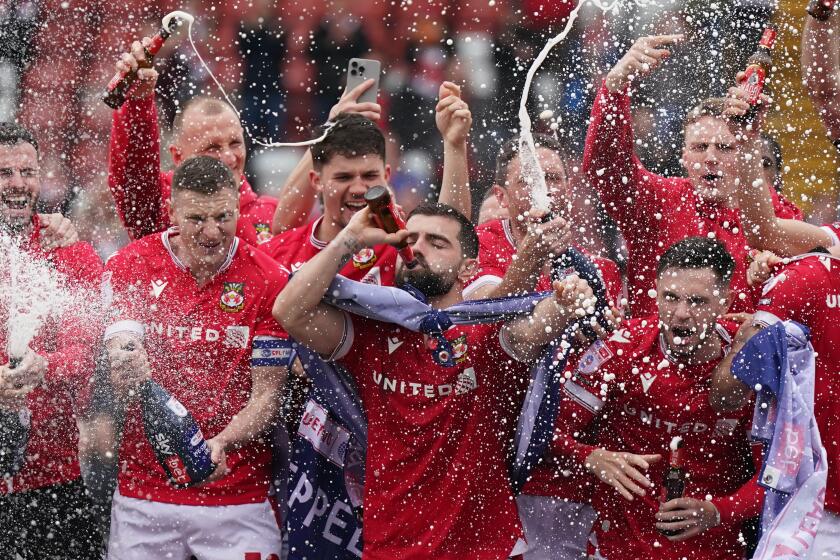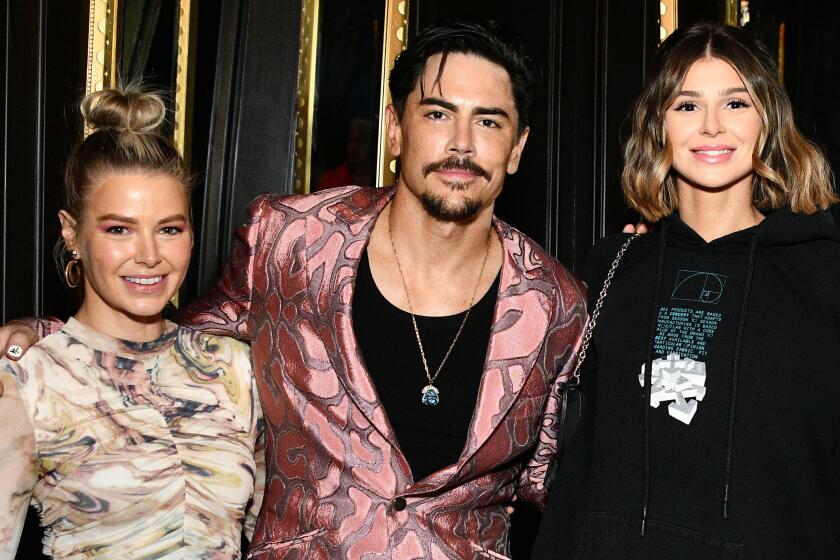Happy verdict
In NBC’s “Harry’s Law,” Kathy Bates stars as Harriet Korn, a bored, 60-year-old, pot-smoking patent lawyer who chucks her career out the window to take on lost causes and hard-luck cases at a storefront law firm in a rough-and-tumble Cincinnati neighborhood.
Until two months ago, “lost cause” and “hard-luck case” were apt descriptions for “Harry’s Law” itself. Although created by David E. Kelley, whose resume includes the hits “Ally McBeal” and “Boston Legal,” “Harry’s Law” was expected inside and outside NBC to be dead on arrival.
Instead, “Harry’s Law” has turned into NBC’s most-watched show of the season and the only new program that is pretty much a lock to return for a second season.
Initially developed for the fall, “Harry’s Law” was pushed by NBC to January while Kelley retooled the pilot. Then NBC decided -- in a move that demonstrated something less than full confidence -- to put on only six of the 12 episodes that were made.
“The odds were pretty formidable against us,” said Kelley. “We never got the feeling they thought we were going to be around for long.”
It didn’t help that at the same time Kelley was struggling to get “Harry’s Law” off the ground, the cable giant Comcast Corp. was closing its deal to acquire NBC Universal. A new programming team would soon be in place, and the old team -- the people who were at least somewhat invested in “Harry’s Law” -- were heading to the exits.
NBC wasn’t alone in doubting the show; many critics also bashed Kelley’s latest effort. “Throw the book at criminally bad ‘Harry’s Law,’ ” wrote USA Today. “ ‘Harry’s Law’ is littered with bogus courtroom rambling on soap boxes so tall they are an insurance claim waiting to happen,” added the Hollywood Reporter.
Even the show’s set was mocked. The New York Times wrote that the “crime-infested neighborhood” where Harry opens her practice looks “about as realistic as the set of ‘Good Times.’ ”
None of this seemed to matter to viewers, though. The premiere episode drew 11 million people, and when the second week’s numbers held, NBC was on the phone asking for the other six episodes.
The success of “Harry’s Law” is even more impressive given that it airs at 10 p.m., an hour that has proved particularly troublesome to the broadcast networks lately as cable has made inroads there and viewers often use the hour to catch up with what’s on their DVRs.
“It’s been years since we’ve had that number of viewers showing up at 10 p.m. on Monday,” said Vernon Sanders, NBC’s executive vice president of current programming.
In the show, Bates and her team set up shop in a high-end shoe store that lost its lease. While assistant Jenna (Brittany Snow) tries to sell shoes, naive associate Adam (Nate Corddry) and lawyer wannabe Malcolm (Aml Ameen) work cases with the gruff Harry. The firm’s nemesis is Tommy Jefferson (Christopher McDonald), a flamboyant rival lawyer who will no doubt remind “Boston Legal” fans of William Shatner’s Denny Crane character.
In many ways, “Harry’s Law” feels like a throwback to the 1970s. Harry gets clients off against extraordinary odds -- not with DNA or finding a forgotten witness but through sentimentality. Her impassioned closing arguments, often enhanced for full weepy effect by a schmaltzy soundtrack, hold that the bad guys are always the government, big business and the wealthy and rarely the people who are actually arrested.
“The scripts sometimes require a leap of faith,” said David Scardino, entertainment specialist for RPA, an advertising agency whose clients include Honda and Farmers Insurance.
“The show is old-fashioned in many ways,” Kelley conceded. “We were trying to appeal to a viewer that was missing a certain kind of television -- character-driven stories as opposed to noise and action.”
Kelley has certainly found his audience. The only problem is that its median age is 58. TV networks prefer younger viewers because advertisers pay more to reach them. “We’d like it to be higher,” said NBC’s Sanders of the show’s rating among adults ages 18 to 49.
Kelley hopes to change their thinking.
“I don’t really understand the bigotry against people over the age of 49,” says the 54-year-old Kelley, noting that folks over age 50 have more money to spend than kids just out of college. “As much as the networks want to declare us irrelevant, we’re certainly not.”
Sounds like a case for Harry.
--
More to Read
The biggest entertainment stories
Get our big stories about Hollywood, film, television, music, arts, culture and more right in your inbox as soon as they publish.
You may occasionally receive promotional content from the Los Angeles Times.







